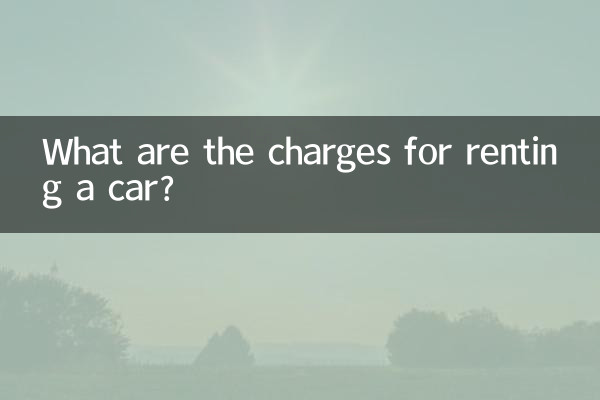What are the charges for renting a car?
In recent years, with the increase in tourism, business travel and group activities, the demand for rental car services has increased significantly. One of the issues that many users are most concerned about when choosing to rent a passenger car is the charging standard. This article will combine the hot topics and hot content on the Internet in the past 10 days to provide you with a detailed analysis of the charging standards for car rentals and provide structured data for reference.
1. Main factors affecting rental car charges

The charging standard for renting a car is usually determined by multiple factors. The following are some common influencing factors:
| Influencing factors | illustrate |
|---|---|
| car model | The rental prices for different types of vehicles (such as buses, minibuses, and commercial vehicles) vary greatly. |
| Rental length | Billed by day, hour or mileage, the longer the duration, the lower the unit price may be |
| Mileage | Some companies will limit free mileage, and the excess will be charged per kilometer. |
| Chauffeur service | Does it include driver wages, food and accommodation, etc. |
| Additional services | Such as insurance, cleaning fees, road and bridge tolls, etc. |
| Seasons and regions | Prices may rise during peak seasons or in popular cities |
2. Common rental car models and reference prices
The following is the quotation range of mainstream rental car models on the market recently (data statistics are based on the last 10 days):
| car model | Number of seats | Daily rental price (yuan) | Driver service included |
|---|---|---|---|
| 7-seater business car | 7 | 500-800 | yes |
| 14-seater minibus | 14 | 800-1200 | yes |
| 30-seater bus | 30 | 1200-1800 | yes |
| 45-seater bus | 45 | 1500-2200 | yes |
| 55-seater luxury bus | 55 | 2000-3000 | yes |
3. Description of additional fees
In addition to the base rental fee, renting a car may also incur the following additional charges:
| Fee type | illustrate | reference price |
|---|---|---|
| Excess mileage fee | Exceeding the daily mileage limit | 2-5 yuan/km |
| Driver overtime pay | Exceeding agreed working hours | 50-100 yuan/hour |
| Parking Fee | Parking fees at scenic spots/highways etc. | Actual reimbursement |
| tolls | highway tolls | Actual reimbursement |
| cleaning fee | Charged when the vehicle is severely damaged | 100-300 yuan |
4. Recent hot topics and car rental suggestions
1.Prices fluctuate significantly during holidays: Data in the past 10 days shows that as the National Day holiday approaches, car rental prices in many places have increased by 20%-30%. It is recommended to book 1-2 months in advance.
2.New energy buses attract attention: Driven by environmental protection policies, the demand for electric bus rentals has increased. Some cities offer new energy models, with daily rental prices 10%-15% higher than traditional models.
3.Security service upgrade: Many places require car rental companies to be equipped with on-board fire extinguishers, first aid kits and other equipment, and some companies have included the cost of safety kits (50-100 yuan/day) in their quotations.
4.Package services are more cost-effective: Many companies launch "all-in-one price" packages, including 300 kilometers per day, 10 hours of driver service, etc., which saves 15%-25% compared to individual billing.
5. Tips to save money on renting a car
1. Choose non-popular models (for example, minibuses are easier to negotiate than buses)
2. Avoid peak traffic during holidays and weekends
3. Long-term rental (more than 7 days) can get 10-10% discount
4. Bidding through formal platforms is more transparent than directly contacting car owners.
5. Confirm whether the quotation includes all costs to avoid hidden consumption
Summarize: Rental car charging standards are affected by multiple factors. It is recommended to choose the appropriate car model and service content based on actual needs, and understand all fee details in advance. By comparing the quotations from different service providers, you can find the most cost-effective car rental plan. Recent market data shows that advance planning and flexible choice of vehicle use time are the keys to controlling costs.

check the details

check the details